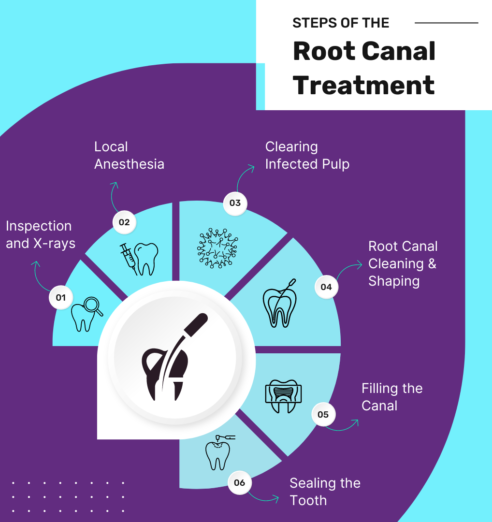Root Canal Treatment for Infected Tooth: Symptoms & Cure
No one likes to hear they need a root canal. Just the mention of it can send chills down the spine. But let’s demystify this procedure a bit. A Root Canal Treatment is actually a common and straightforward procedure that can save your tooth and alleviate pain. Whether you’re facing an infected tooth or just want to learn more, this guide has got you covered.
What is Root Canal Treatment?
A root canal treatment is all about rescuing a tooth that is badly infected or decayed. When the pulp, which is the soft tissue within the tooth holding nerves and blood vessels, gets infected or damaged, a root canal is undertaken to clear out the illness and safeguard the tooth from more disturbance.
Indications of a Potential Need for a Root Canal Treatment
You might be wondering how to know if you need a root canal. Here are some telltale signs:
- Severe tooth pain, especially when chewing or applying pressure
- Prolonged sensitivity to hot or cold temperatures
- Darkening or discoloration of the tooth
- Swelling and tenderness in the nearby gums
- Persistent or reoccurring gum pimples
If you notice any of these symptoms, it’s best to see a dentist as soon as possible.
What Happens During Root Canal Treatment?
Inspection and X-rays: The dentist will first look over your tooth and get X-rays to analyze the intensity of the problem.
Local Anesthesia: You'll be given local anesthesia to numb the area surrounding the affected tooth. Even after its fearsome recognition, a root canal is generally no more uncomfortable than having a regular filling.
Wiping Out the Infected Pulp: The dentist will crank out an entrance in the tooth and clear away the infected or damaged pulp.
Cleaning and Molding the Root Canals: The unfilled pulp chamber and root canals are then cleaned, sterilized, and molded to enable filling.
Filling the Canals: The cleaned canals are filled up with a biocompatible thing called gutta-percha.
Securing the Tooth: At last, the tooth is sealed off with a short-lived filling. Later, you'll revisit to receive a permanent crown or filling installed to bring back the tooth's functionality and aesthetics.
Aftercare and Recovery
As a result of the procedure, it's natural to experience some discomfort or light soreness. Here are a few guidelines to ensure a hassle-free recovery:
- Steer clear of chewing on the treated tooth until it's totally recovered.
- Uphold good oral hygiene by brushing and flossing daily.
- Abide by your dentist's guidelines relating to medication and follow-up visits.
What are the Types of Root Canal Treatment?
Depending on the condition of the tooth, there are various root canal procedures available:
- Primary Root Canal Treatment: This is the first step in removing infected pulp and Tooth Cleaning.
- Retreatment: Following a root canal, a tooth may occasionally fail to heal or develop new problems. Retreatment entails treating these problems by reopening the tooth.
- Endodontic Surgery: To treat an ongoing infection or inflammation, surgery may be required in specific circumstances. This can involve treatments such as apicoectomy, in which the root tip is extracted.
Does Root Canal Treatment Hurt?
People often worry about this. A root canal procedure is typically no more uncomfortable, thanks to breakthroughs in anesthesia and surgical methods. It is usually the infection, not the procedure itself, that causes the pain you may feel. The majority of patients discover that when the infected pulp is removed, their suffering considerably decreases.
Can I Delay Root Canal Treatment?
Withholding a root canal is not a good idea. An infected tooth can bring on more intense issues, including abscesses, bone loss, and the spread of infection. Remedying the problem without delay can rescue your tooth and minimize the risk of unwanted consequences.
Is There a Minimum Age for Root Canal Treatment?
Root canal treatment can be performed on patients of all ages. However, pediatric patients might receive different types of treatment depending on their specific needs and the development stage of their teeth.
What Not to Eat After Root Canal Treatment?
After a root canal, you’ll want to avoid certain foods to ensure proper healing:
- Hard foods like nuts or ice
- Sticky foods like chewing gum or caramel
- Very hot or cold foods and drinks
- Crunchy snacks like popcorn
Stick to soft foods and lukewarm liquids until your tooth feels more comfortable.
Can I Brush My Teeth After Root Canal Treatment?
Yes, you can still brush your teeth following a root canal procedure. But be gentle around the diagnosed spot and utilize a soft-bristled toothbrush. Keeping your mouth clean is necessary to stay away from any further complexities.
What are the Side Effects of Root Canal Treatment?
While root canal treatments are generally safe, you might experience some temporary side effects:
- Mild to moderate pain or discomfort
- Swelling or tenderness around the treated tooth
- Slight bleeding or sensitivity
These symptoms usually subside within a few days. If the symptoms remain or become worse, see your dentist
What are the Disadvantages of Root Canal Treatment?
Even though the positive aspects of a root canal far over-shadow the negative aspects, it's crucial to be knowledgeable about probable disadvantages:
- The tooth may end up being brittle gradually and might feel the necessity for more dental work.
- There is a little risk of infection if the process is not executed the right way or if aftercare is not obeyed.
- The cost can be higher than other dental solutions, though it is oftentimes handled by dental insurance.
How Much Does Root Canal Treatment Cost?
The cost of a root canal treatment can vary widely depending on several factors, including:
- The location of the tooth (front teeth are generally less expensive than molars)
- The severity of the infection
- The dentist’s fees and whether you need a crown
On average, you can expect to pay anywhere from $700 to $1,500 per tooth. Dental insurance often covers a significant portion of the cost.
Elite Smile Family Dentistry: Your Partner in Dental Health
At Elite Smile Family Dentistry in Northville, MI, we realize that dental procedures can be terrifying. Our team is dedicated to giving you the best treatment in a happy and friendly environment. From routine check-ups to intricate treatments like root canals, we're here to ensure your oral health is at its absolute best.
Our seasoned dentists make use of the most advanced technology and techniques to make your visit as painless and worry-free as possible. We put in the time to discuss your treatment options and resolve all your queries, so you feel confident in your care.
Ready to book your Appointment? Contact Elite Smile Family Dentistry today
Conclusion
Root canal treatment may strike as frightening, but it's a conventional and effective method to rescue an infected tooth. Grasping the symptoms, process, and aftercare can help debunk the course of action and roll back nervousness. By addressing the infection on time and sticking to your dentist's advice, you can ensure an easy recovery and preserve good oral health.
At Elite Smile Family Dentistry in Northville, MI, our thoughtful team is here to grant top-notch care and help throughout your dental journey. Don't hesitate to contact us for any of your dental needs.



